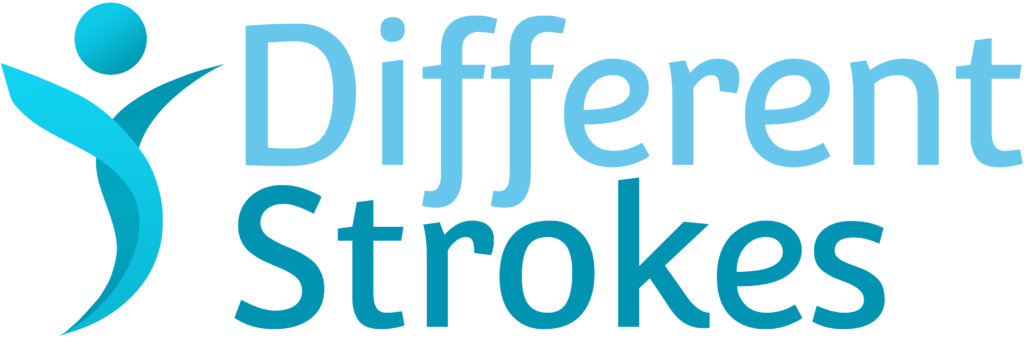I have helped services to grow and have developed new and ground-breaking services (winning an award for innovation!), because I have always been driven to help meet peoples’ needs.I’ve been married for 35 years and have four beautiful daughters aged between 17 and 31. My stroke happened when I was on a day trip to London with my 19-year-old daughter. I had taken her and her friend to see some fashion exhibitions. After a two and a half hour drive on the M4, I had just parked in Hammersmith and was walking to a tube station. I was just working out which way to go, and crossed a road when suddenly I was picked up and spun around by the ankles, like someone spinning with a discus at the Olympics.
At least that’s how it felt. The world was still, and I was spinning around. I grabbed hold of a post, but the spinning didn’t stop, so I sank to my knees. A number of people stopped cars, etc., to make sure I was alright. I felt sick, and I was sick. ‘That was a waste of a Costa coffee!’ I remember thinking.
I wanted to close my eyes and I had a pain in the side of my head, behind and above my ear. I kept saying that my head hurt. I wanted to sleep. I was worried about my daughter and her friend. I kept saying “I’ll be OK in a minute, I just need to rest”.
I was reluctant to go to hospital because I didn’t want to leave the girls. I went because my daughter wanted me to and I was too tired to argue. I was taken to Charing Cross hospital Hammersmith. I was lucky as it has an excellent stoke unit. I’d passed a First Aid at Work course a couple of weeks before my stroke, so when I was being asked to speak, raise my arms etc., I knew I was being given the standard stroke test: my Face hadn’t dropped; my Arms were OK; my Speech wasn’t slurred’ – so Time hadn’t seemed an issue.
What I now know is we must BEFAST. Balance and Eye movement/control are also stroke indicators. So as my eyes were flickering, and my balance was non-existent, I had two significant signs of a stroke. Lifestyle-wise I’ve never smoked or dunk alcohol and we cook fresh food, so the cause of the stroke was a big question.
I slept most of that day and the following day family came up from Bristol to see me. I was relieved that they were all OK. For myself I had two thoughts: to keep as still as possible to let the body rest and repair itself; to get up and walk as soon as I could. Most recovery is made in the first few weeks, so thought I’d need to push as hard as I could. When I asked to get out of bed to walk to the bathroom I caused a bit of concern. “Have you been told you can walk?” I was asked, to which I replied, “No one has said I can’t”.
There followed a series of scans etc., while I stayed keeping still between physio and exercise.
After 4 days and 3 nights in hospital I was allowed home and walked out unaided. A miracle! Once home I had more physio and exercises for a while, then was left to carry on myself. From the moment I was told I’d had a stroke my focus was on being able to somehow walk my daughter down the aisle at her wedding in July. I guess the drive to do this helped me a lot – and I achieved my goal!
I know so many people have been more seriously affected physically than me. However, I want to say that there are some people who can seem ok from their appearance but who are still affected significantly in their ability, stamina, and recovery.
People often say, “You’re looking well”. It’s an encouragement, or at least that’s how it’s meant. Yet the effort it takes to ‘look well’ can be enormous. Not being able to drive is a major blow. Suddenly my wife is doing all the driving, including my turns at parent taxi! I had symptoms for two-three months after the stroke so I’m having to be assessed before I can drive again. I feel guilty about what I can’t do, as well as frustrated.
It can be isolating after a stroke. I was lucky that a friend of mine contacted me on Facebook and told me about a support group he’d found helpful. So, I ‘liked’ Different Strokes – I’ve liked and been grateful for the community support of the Facebook group ever since. Just being able to check out with people who understand is brilliant! To share progress, challenges, victories, cares – and concerns – is wonderful. The group really does support each other. Having people who can advise on life after stroke is essential, and for me Different Strokes has provided that. Seeing someone displaying their latest painting, or a video of their new exercise is so encouraging.
We are in the run up to Christmas and a time when I’ve been used to giving to others, like when I worked in homeless hostels, when I’ve been used to playing carols with a Salvation Army Band, but I’m not allowed to play since my stroke happened on my consultant’s advice.
So, I’m looking forward to a quieter Christmas. If fatigue lets me I’ll try and volunteer somewhere. I’m planning to complete some on-line training in the New Year, and hopefully get a part-time job. I’m also planning to continue writing and to publish a book of my poetry.
What have I learned? What would I tell others?
Firstly BEFAST, Eyes and Balance can be an indicator of stroke and don’t waste time because the first 3-4 hours are vital in treatment!
Secondly, if you do have a stroke, link up with Different Strokes. Either attend one of their groups or join the Facebook group, or do both.
Thirdly, remember that Recovery is a journey, not a destination. When we have a stroke, something changes but the body and brain are amazing and can learn new ways to cope. Recovery is a continuum, so keep doing the exercises. I thought I could stop when I’d achieved what I wanted to, but I’m learning that it isn’t like that.
Finally, I’d say it doesn’t mean life is over. I mean some things are different. Things we’ve taken for granted may now have to be worked at. But life can be good, fulfilling, and enjoyable. We may have to take things easier.
So BEFAST and slow down.”
















